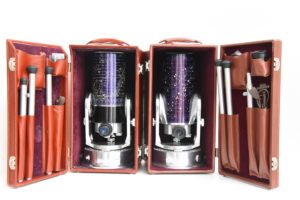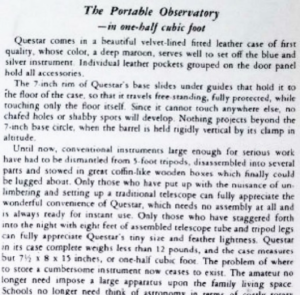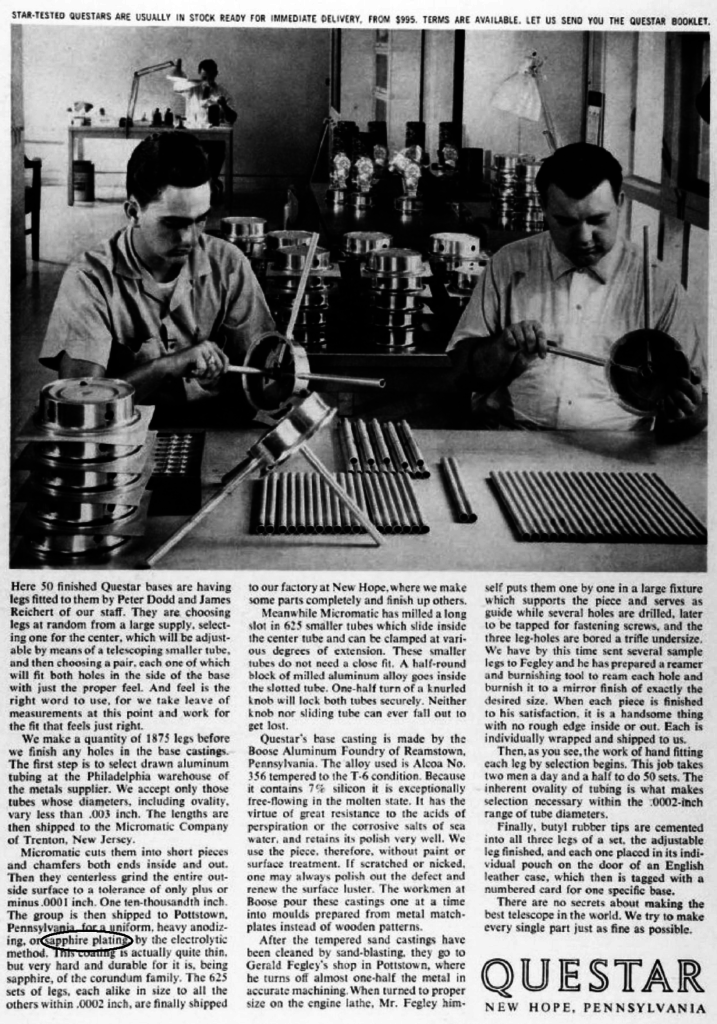By Ben Langlotz
|
June 12, 2017
|
Business, Firearms Industry Advice, Marketing, Opinion Pieces
|
0 Comments
Why are you still marketing to Poor people?
Our Industry’s Missing Market Segment

Almost Nothing to Do With Guns, But…
Have you ever sat down to a big round table with a bunch of industry folks, and the conversation just didn’t quite get off the ground? I had a dinner last month with a good client, but with a bunch of key people I didn’t yet know very well. When the conversation stalled, I got out my conversational secret weapon: “So what hobbies and enthusiasms do y’all have outside of shooting?”
When I ask this old standby question, I learn just how diverse we are. The responses ranged from outdoor garden model railroad layouts with vintage German locomotives, to ballroom dancing, to photography, to motorcycles (that’s a popular one!)
Mine is astronomy. Telescopes. One particular brand, actually. I love locating, buying, and restoring Questar telescopes. I even look through them occasionally. I was an astro-nut as a kid, and made my own telescope. A Questar was then well known as being the finest portable telescope one could own, and they cost as much as a good used car. Rich guy toys you may have seen advertised in Scientific American magazine. Beautifully hand-crafted, optically superlative, and one of the finest manufactured objects I have ever seen (until I discovered guns).
My dream came true as a teenager when I won some scholarship money, and Mom said I could spend it on anything and I didn’t have to save it for college. Instead of a car or a spring break trip, I bought a Questar. I got it used from a Minneapolis bank executive who had presumably been seduced by the Questar ads but didn’t use it enough to justify keeping it. Other than a few treasured gifts, it was and still remains my most prized possession.
I didn’t realize it at the time, but my desire for this optical and mechanical jewel was due to an advertising campaign that influenced my desires like a hypnotist. Much later in life, I came to appreciate especially effective marketing. When I look back on those vintage advertisements that shaped a teenager’s urges I was amazed at how good they still were. I can now see what they were doing to the reader’s brain, and even knowing that, they still worked!
I’ve heard it called “Marketing to the Affluent”. The reason I’m writing about it is because frankly, I don’t see anyone in the industry doing it. Perhaps I’m not seeing how Beretta markets six-figure engraved bird guns because their ads don’t reach me. (Note, because vocabulary is critical, they probably don’t call them “bird guns” – instead they might be “fowling pieces.”) And I suspect they have a waiting list and don’t need to advertise these items at all.
“Let’s Talk ARs” vs. “Shall We Discuss the Autoloading Phenomenon?”?
The marketers and linguists call it “register.” It’s the style of language that conveys a tone. Formal, casual, upscale, downscale, macho, gentle, etc.
If you were trying to reach your existing customers (the same ones everyone else is trying to reach) you might run an ad that says “Let’s talk ARs.” You might come up with a better clickbait title for a social media post that was reaching your prospects (“You should have seen her face when he said his AR had these 5 critical features!”), but it would have a tone that was comfortable, maybe a little macho or military in its bearing, with a casual between-us-guys feel.
The high-brow second example, “Shall We Discuss the Autoloading Phenomenon?” sounds totally out of tune for your market, doesn’t it? It sounds snobby, elitist, and expensive. Maybe I’m crazy and just want to write about my non-gun hobby this month, or maybe this notion has no utility to any of my readers, but I have to get this off my chest. (I just realized I wrote “utility” instead of “value” or “usefulness” – do you see how writing about the tone can influence the way one thinks?)
Everyone seems to compete for the same segment of gun enthusiasts. It’s logical to try to convince people who already love guns to pick your gun – you only have to convince them of one thing. Trying to sell to people who don’t want guns requires overcoming two barriers: You have to convince them they need a gun, then you have to convince them to pick yours. If you have as high as a 1% success rate at each of those two steps you’re a marketing genius, yet you’ll sell to only one in ten thousand. Which is why selling to people who already love guns is so popular.
What I wonder about is the possibility to sell to those who might be interested, but lack information. They are at least curious. Oh, and for this hypothetical example I’m going to focus on the financial elite. Not just billionaires, but also executives who’ve invested in safe rooms in their residences, or who collect $10,000 watches, or who buy new golf clubs every year. They’re interested in owning fine gear, and are concerned about the risks our society faces. They might be physicians, university professors, or even… Democrats.
So, for this crazy marketing exercise, we’d better have a plan to make money. My notion is that if we can sell at a much higher profit margin, we might be able to afford the lower response rates we get. And because we won’t be competing in a crowded field (until others catch on after we’ve established a dominant brand) we’ll have the whole segment to ourselves. So, let’s sell to rich folks who don’t want cheap guns, they want the best, including the best sales experience, a complete package without more decisions or research to undertake, and perhaps even guidance and training – these customers don’t like to feel incompetent.
I know Reed Knight probably offers a package that exceeds $10,000. That’s the spirit of what these high-end customers are after. But how to market this to the Faculty Club and Wall Street types?
It’s in the language. If a company selling geeky hobby toys can transform them into sophisticated instruments with mere words, w
hat can you learn from their example? Imagine listening to the voice of a turtleneck-wearing, pipe-smoking sophisticate of the 1950s. This is a tiny excerpt from a 2-page ad of fine print text, selling the box the product comes in:

Selling the Sizzle?
“The amateur no longer needs to impose a large apparatus upon the family living space.” No one talks like that, but someone who needs persuading to spend a month’s salary on a “toy” might need to be urged to think of the sophistication of the purchase.
Some other words that convey almost no information, but add to the atmosphere of luxury and sophistication are “fitted” and “grouped.” The competition comes in “coffins,” as if they contain dead technology.
The Fatal Mistake Gun Marketers Make
I’m appalled at how often I see marketing in our industry that is unfriendly to newcomers, efforts to position a company or product as “elite” falls flat and ends up insulting and alienating them. It’s like those insecure gun guys on Facebook who need to find something to criticize in order to boost their own self-image. But if a guru finds fault with just about everyone else, including respected professionals, what is a newcomer seeking training to expect? Is an insecure newcomer more likely to seek training from someone who is generous with free information that brings them up to speed, or with someone who finds fault with everyone else? I’ll go with a patient educator over an arrogant drill sergeant every time. And this is proven out time and again as I observe the greatest successes in our industry are with those who are patient with newcomers.
As one who picks up the phone enough times each week to answer a call from a startup gun inventor who found me on the internet by googling “Gun Patent Lawyer” (try it!) I get all the same basic questions, and provide the same patient answers. It turns out that by helpfully advising, I make them feel (and be) smart – which does the job better that trying to prove that I’m smart. I’d never try to impress by rattling off a lot of legal mumbo-jumbo. So why do so many companies present their offering assuming that every potential customer is an expert? Education builds trust and makes better customers – the more they know, the more comfortable they are spending more than originally intended. And if you’re the one who transformed them from ignorant to sophisticated, you’ll be their first choice.
One strategy for this is to get into technical nitty gritty that turns the prospective customer into one who has been well-informed. By you – of course – so that the principles they apply are the principles that inevitably lead to your product as the ideal choice. The approach may initially seem to be off-putting or snobby, but the customer is welcomed into the fraternity, and the only secret password is “How do I place an order?”

The old telescope company ran an ad that was probably the geekiest, nerdiest thing I have ever seen. Start reading and you’re sure to go to the end. At least if you’re a potential customer. Honestly, does the bank VP who just got a big bonus really care what alloy of aluminum flows well when molten? No, but he cares about being in on some important information, and the product has a number of “reasons” why it might be special. Persuasion experts call this the essential “because,” because it gives people a reason to do what they emotionally want anyway, but need to tell themselves there is rationality to their choice.
My favorite highlight of this ad is circled. We might recall that anodized aluminum is an oxide layer known as “alumina,” and you might even know that sapphire is the crystalline version of this same substance. But what genius to take a smelly metal treatment process and promote it to something worthy of Tiffany, Rolex, or NASA!
I challenge any readers of this newsletter with the power to do so to use this formulation in their advertising. I’d love to see what kind of a price premium one could get for a “Sapphire-plated AR lower.” The lesson isn’t to deceive, of course, but to create an atmosphere of accessible sophistication. I’m imagining my father in this era as an aerospace electrical engineer BS-ing with his colleagues about that new telescope they were thinking about buying. Others might join in to debate the merits of centerless grinding, or the temper of aluminum. Perhaps a mechanical engineer might bring them up to speed on whether “sapphire plating” was really accurate (I’d say that if it isn’t crystalline, it isn’t sapphire).
But the lesson here, as in any business seeking to reach affluent buyers, is to inform and elevate your customers. So, if this month’s personal tale from my non-gun hobby has informed and elevated you into adopting a new branding strategy to reach new markers, give me a call so we can develop a strategy.